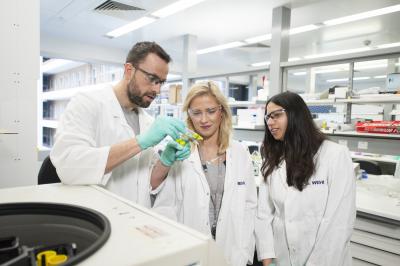Immune cell discovery could help to halt cancer spread

Melbourne researchers have revealed the critical importance of highly specialized immune cells, called natural killer cells, in killing melanoma cells that have spread to the lungs. These natural killer cells could be harnessed to hunt down and kill cancers that have spread in the body. Dr. Nick Huntington (left), Rebecca Delconte (center) and Dr. Priyanka Sathe led the team from the Walter and Eliza Hall Institute of Medical Research, Melbourne, Australia. Credit: Walter and Eliza Hall Institute of Medical Research
These natural killer cells could be harnessed to hunt down and kill cancers that have spread in the body.
The team, from the Walter and Eliza Hall Institute, also found natural killer cells were critical to the body's rejection of donor bone marrow transplants and in the runaway immune response during toxic shock syndrome.
The discoveries came after the team showed that a protein called MCL-1 was crucial for survival of natural killer cells, in research published today in the journal Nature Communications. The discovery will help to determine how natural killer cells can be manipulated to fight cancers and other disorders.
Dr Nick Huntington, Dr Priyanka Sathe and Ms Rebecca Delconte from the Walter and Eliza Hall Institute said MCL-1 could be a target for boosting or depleting natural killer cell populations to treat disease. Natural killer cells are immune predators, scouring the body in search of foreign invaders such as viruses, and sensing changes in our own cells that are associated with cancer.
Dr Huntington said the team showed natural killer cells were needed to fight off invading tumour cells that had spread past the original cancer site.
“We discovered MCL-1 is absolutely essential for keeping natural killer cells alive,” Dr Huntington said. “Without natural killer cells, the body was unable to destroy melanoma metastases that had spread throughout the body, and the cancers overwhelmed the lungs”.
“Knowing how important natural killer cells are for detecting and destroying cancer cells as they spread suggests they would be a good target for boosting immune defenses to treat cancer.”
Natural killer cells are present in high frequency in our blood and patrol the body's 'frontlines' – the lungs, intestines, mucous membranes and skin – to detect and destroy diseased cells. However these predatory natural killer cells are a double-edged sword.
Dr Huntington said the team showed natural killer cells also played a role in death from toxic shock (sepsis), and in rejecting bone marrow transplants.
“Natural killer cells led the response that caused rejection of donor stem cells in bone marrow transplantations,” Dr Huntington said. “They also produced inflammatory signals that can result in toxic shock syndrome, a potentially fatal illness caused by bacterial toxins that causes a whole-body inflammatory reaction.”
Dr Huntington said the discovery provided a solid lead to look for ways of boosting natural killer cells when they are needed in higher supply, or depleting them when they are causing illness.
“We showed MCL-1 levels inside the cell increase in response to a blood cell signalling protein called interleukin 15 (IL-15). We previously knew IL-15 boosted production and survival of natural killer cells, and we have shown that IL-15 does this by initiating a cascade of signals that tell the natural killer cell to produce MCL-1 to keep it alive.”
“Now that we know the critical importance of MCL-1 in the survival of natural killer cells, we are investigating how we might manipulate this protein, or other proteins in the pathway, to treat disease,” Dr Huntington said.
The research was supported by the Australian National Health and Medical Research Council, The Menzies Foundation and the Victorian Government.
Media Contact
More Information:
http://www.wehi.edu.auAll latest news from the category: Life Sciences and Chemistry
Articles and reports from the Life Sciences and chemistry area deal with applied and basic research into modern biology, chemistry and human medicine.
Valuable information can be found on a range of life sciences fields including bacteriology, biochemistry, bionics, bioinformatics, biophysics, biotechnology, genetics, geobotany, human biology, marine biology, microbiology, molecular biology, cellular biology, zoology, bioinorganic chemistry, microchemistry and environmental chemistry.
Newest articles

A universal framework for spatial biology
SpatialData is a freely accessible tool to unify and integrate data from different omics technologies accounting for spatial information, which can provide holistic insights into health and disease. Biological processes…

How complex biological processes arise
A $20 million grant from the U.S. National Science Foundation (NSF) will support the establishment and operation of the National Synthesis Center for Emergence in the Molecular and Cellular Sciences (NCEMS) at…

Airborne single-photon lidar system achieves high-resolution 3D imaging
Compact, low-power system opens doors for photon-efficient drone and satellite-based environmental monitoring and mapping. Researchers have developed a compact and lightweight single-photon airborne lidar system that can acquire high-resolution 3D…





















